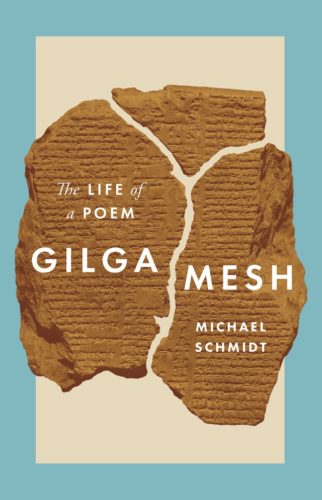Book Review: “Gilgamesh: The Life of a Poem” — A Dazzling Study of the Oldest Long Poem in the World
By David Gullette
This is a wonderfully readable book, sure-footed in its scholarship but hip and occasionally hilarious in its tone.
Gilgamesh: The Life of a Poem by Michael Schmidt. Princeton University Press, 144 pages, $24.95.

Unless we are trained Scholars of the Book, we may take our books for granted: they were written, revised, published, and now they sit on our shelves.
But how much is missing? So many tens of thousands of ancient texts were destroyed by the fire (and neglect) at the Library of Alexandria, that we have no idea of how much was lost. Unknown plays by Aeschylus and Sophocles and Euripides and even playwrights whose names we don’t know? Better, longer versions of the Homeric poems? We don’t know.
We almost lost Beowulf, which exists in a single manuscript copy that barely escaped a 1731 fire in London, and even that copy is damaged.
But at least we have Gilgamesh, that old story of the eponymous hero and his intense friendship with his doomed buddy, Enkidu — what Michael Schmidt calls “the oldest long poem in the world,” that was ancient even in 5th-century BCE Athens
But in what sense do we “have” Gilgamesh? Not only was the story composed (and recomposed, and altered) over a period of more than a thousand years after being begun maybe four thousand years ago, but it wasn’t written on paper (or papyrus) — it was stamped in cuneiform (those wedge-shaped marks that look like golf tees) on tablets of clay, which certainly kept it safe from tearing or burning. But those ceramic tablets were fragile. And they inevitably broke. And the fragments were scattered in a wide swath from Turkey to Iran.
The shards of the poem were first discovered in 1853, and since then scholars have been working to fit the fragments together into a meaningful whole, like trying to fit together the pieces of a puzzle after a hurricane. Even today, some ISIS looter could conceivably be selling on the black market a key bit of clay that might suddenly clarify an episode or a line. So the shattered tablets of this old poem are still in flux. And as for who “wrote” it, Schmidt says “Gilgamesh is made by a river, by fire, by generations of scribes, by shepherds, ruin-robbers, archaeologists and scholars. In all the debris there are literally no vestiges of an identifiable poet to be found.”
As for how translators deal with this puzzle-with-missing-pieces, Schmidt is particularly sharp. Unlike Classical Greek or Latin of the Age of Virgil, Gilgamesh was “written” (or stamped in clay) in Old Babylonian, Babylonian, Hittite, and a few other obscure languages, which themselves have been deciphered only in the last century and a half — that is, their codes have been broken. Many of us can read Greek and/or Latin, but almost no translators are or have been simultaneously poets and Assyriologists.
This linguistic barrier, plus the fragmentation of the text, means even the most assiduous translator has to do a lot of semi-educated guessing and invent bridges or emendations to link the fragments together so they make consecutive sense. Of course, one translator’s best guess can be another translator’s complete distortion.
Despite the unparalleled difficulties, we have a cluster of good translations that give us the main parts of the poem, with its narrative shape and the deeds of its central characters. Schmidt’s favorite translation is by Andrew George (1999) which “stays as close as his English can to the surviving originals.” Here’s a sample:
and [learnt] of everything the sum of wisdom.
He saw what was secret, discovered what was hidden,
He brought back a tale of before the Deluge.
What the jumbled typography means is that “we could trust the words in roman type; and we could be quite confident about the words supplied in square brackets” and “what is in italics seems to [George] plausible interpolation, but is not authorized by any existing fragment or parallel. And the ellipses [those …] are precisely that, breaks that cannot be confidently repaired.”
A new tablet discovered in 2006 ratifies George’s thoughtful guesses. We are now pretty sure how the passage begins: “He everywhere explored the seats of power,/ knew of everything the sum of wisdom.” New tablets, gaps filled, increasing our confidence that we have the true (or at least truer) text before us. Year by year, fragment by fragment, Gilgamesh comes into clearer and clearer focus. This focus will grow crisper and more ample, generation by generation, as the ceramic evidence comes trickling in, shard by shard, or if we’re lucky, tablet by tablet.

A scene from the 2013 Constellation Theatre Company’s stage version of “Gilgamesh.”
Schmidt depends heavily on the Andrew George and Jenny Lewis translations, but touches on other translators as well. Charles Olson saw the poem as giving us access to “primordial and phallic energies” but he never actually translated Gilgamesh. Jenny Lewis’s Gilgamesh Retold: A Response to the Ancient Epic (2018) “is only the second complete English version by a woman told in modern poetry. As a response, and a specifically gendered response at that, it stands apart from Stephen Mitchell’s and David Ferry’s ‘retellings.’”
Schmidt feels that Lewis “gives the hero’s friend Enkidu rather more agency than earlier translators and she keeps him alive longer than the original warrants.” Here’s a sample of Jenny Lewis’s translation, which Schmidt describes as having “a gapped or sprung phrasal line”:
How the world was birthed the weight of life
Heavy as a flood the full womb the still grave
Schmidt feels “the imagery of breaking waters, birth and womb wrest the poem from its usual male-gendered specificity.” And as for her formatting, “She suggests fragmentation visually, but resolves it in terms of sense and syntax.” This means, says Schmidt, that Lewis’s Gilgamesh is “the most voice-friendly version since Edwin Morgan’s theatre adaptation.”
Of Yusef Komunyakaa’s 2006 adaptation of the poem as a verse play in “Greek tragic” form, Schmidt opines that it is “a convincing transposition, but remote from Gilgamesh.
In the central part of the book, Schmidt works his way through what he calls the twelve “tablets” that have so far been provisionally reconstructed, and does a survey of the various ways the poem has been imagined, read, and adapted.
This is a wonderfully readable book, sure-footed in its scholarship but hip and occasionally hilarious in its tone. It makes the story of Gilgamesh and his beloved friend Enkidu seem both near to us and extremely far away. I’d recommend this dazzling study of the history of the poem not just to poets and theatre people, but to anyone who loves the grand old stories that have survived the all-shattering chaos of history and still manage to find their way into our libraries and our hearts.
David Gullette is Professor Emeritus of English at Simmons University, and Literary Director of The Poets’ Theatre. His poems have been published widely, and are collected in Questionable Shapes (Cervena Barva Press).
